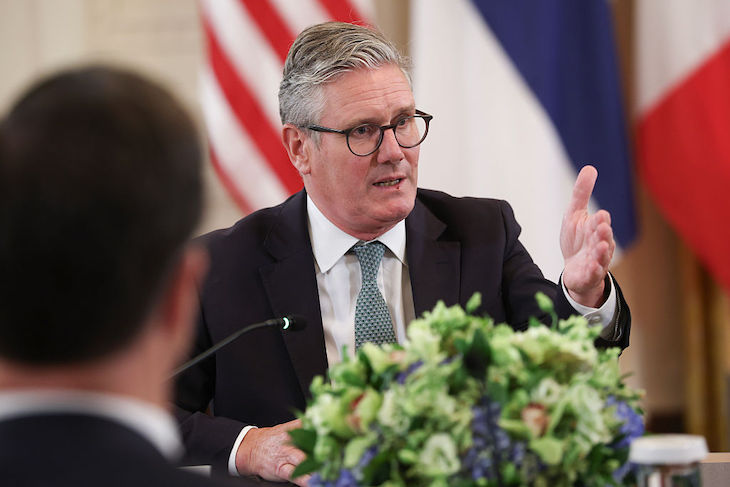When French president Emmanuel Macron stormed to power in 2017, his ability to respond to the weakness of France’s mainstream parties, capture a large centrist majority and defeat the populist right seemed to offer a model of hope for liberal internationalists everywhere. Yet despite the president’s undeniable talents as a political communicator, the fate of his administration illustrates the desperate futility of any politicians left clinging to the centrist dream.
To the chagrin of countless podcasters and centrist dads, the UK has so far escaped the problems of a Macron-style revolution
Between 2017 and 2025, Macron’s centrist revolution has steadily unravelled. His approval ratings have fallen from 64 per cent to just 19 per cent. Marine Le Pen’s National Rally has swollen from eight seats to 123, becoming the largest party in the National Assembly. Most worryingly, France’s debt to GDP ratio has jumped from 97 per cent to 114 per cent, the third-highest level in Europe. With a no-confidence vote scheduled for next week over prime minister François Bayrou’s attempts to ease this debt crisis with €44 billion (£38 billion) worth of budget cuts – a vote Bayrou looks certain to lose – France is staring down the barrel of its third change of government in scarcely a year.
Such decline is easily pinned on presidential blunders – in particular Macron’s ill-fated decision to call a snap election last June which left France with no clear governmental majority. Yet France’s plight is not the product of individual missteps. Rather, it represents the consequence of a fractured, centrist politics devoid of real principles – a state of affairs towards which the UK is stumbling perilously close.
Macron’s success in 2017 hinged on the weaknesses of the contemporary mainstream parties. The incumbent Socialist Party had imploded after its leader, president François Hollande, left a deeply unpopular legacy of economic stagnation and high unemployment. Meanwhile, the centre-right Republican Party had haemorrhaged credibility in a scandal-ridden leadership contest.
Macron was able to sweep up votes from both sides with a loose centrist offering, the primary appeal of which was simply to offer change from a tarnished status quo, and a feasible chance at defeating Le Pen. The president has drifted steadily towards the centre-right since – particularly on immigration – but his political movement remains defined by the same amorphous centrism that brought it to power.
The issue with this approach is that, across the globe, ageing western economies such as France face near-impossible public spending decisions that demand decisive actions rooted in a party’s narrative, not tacked onto it in retrospect. This is something completely alien to the centrist politics of constant compromise. Indeed, it is a core reason why Macronist governments have lacked the mandate to break France out of its debt crisis through vital austerity measures – a failure that has crippled French politics since the much-contested pension reforms of 2022-23.
To the chagrin of countless podcasters and centrist dads, the UK has so far escaped the problems of a Macron-style revolution. Indeed, in 2022, former Conservative MP David Gauke lamented that we could not get a British Macron because the Labour-Conservative duopoly and the absence of a presidential route to power made it impossible for independents to break through.
In the years since, this situation has dramatically changed. The UK now mirrors the combination of factors that allowed Macron to emerge in 2017: a deeply unpopular Labour government plagued by rebellion; a rump Conservative party tarnished by past scandals and riven by leadership struggles; and a populist right Reform UK with a genuine shot at power.
Yet the UK still lacks the presidential mechanism – and the presidential leadership figure – to provide a credible basis for a centrist breakthrough that could learn from Macron’s mistakes and forge a values-based political identity. As such, if some moderate alliance is the only alternative to the populist right at the next general election, the best we can hope for is either an enfeebled second term for Keir Starmer, a fragile Labour-Liberal Democrat coalition, or some other hodge-podge arrangement that is yet to rear its head.
Britain is facing the worst of both worlds: Macronism without Macron. A mushy centrism without the political operator to give it even a chance at success.
The centrist dream may still hold some appeal to the Rory Stewarts of this world, but Macron’s fate shows that it is a fool’s errand. In a challenging political climate where governments are regularly forced to make painful trade-offs to address near-constant crises – whether in social care, housing or immigration – politics of the lowest common denominator simply is not enough.
Clear principles are crucial for the survival of political parties, but – in times of crisis – they are also essential for the function of government and the future of nations. France is already living with the consequences of forgetting this fact; Britain must do everything we can to avoid following the same path.







Comments